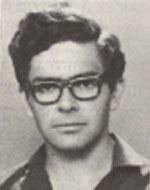Altbaum, Zeev (Wolf)
Ze’ev (Wolf), son of Leah and Yeshayahu, was born on December 1, 1942, in Samarkand, Russia. His first years of life were spent without the father who then fought in the ranks of the Red Army against the Germans. In 1945 the family moved to Poland, where Ze’ev studied in elementary school. When he was 12 his father died of cancer. In 1956 he immigrated to Israel with his mother and his little sister. As part of Youth Aliyah, he was sent to the “Alonei Yitzhak” school, completed his high school studies and successfully passed the matriculation exams. Ze’ev was a kind man, with a sensitive soul full of warmth and love. During the vacations he taught at camps for children suffering from paralysis, which were held in “Alonei Yitzchak”. His young apprentices liked him very much because of his attitude to them and his ability to be both a guide and a friend. Ze’ev was drafted into the IDF in August 1960 and assigned to the Engineering Corps, and after completing basic training he was transferred to the Engineering Corps and was a disciplined soldier who made sure to do everything he was required to do. At the end of July 1963, Ze’ev was discharged from regular army service and was called to serve in the Six-Day War, and after his discharge he began to devote his time to his great love: the art of cinema and television. In the Department of Theater at the Hebrew University of Jerusalem Before the beer “and after working there for a year and a half in his profession, he was hired as a production assistant for Israeli television, where he studied theater, cinema and concerts and devoted his spare time to photography, and taught many young people in the field of film and television. On Yom Kippur, Ze’ev served in the Engineering Battalion, which operated in the Golan Heights on October 16, 1973. He went with his unit to the area of the village of Zermania to rescue tanks that entered a minefield and were subjected to heavy shelling. During the operation, his half-tracks were damaged and Ze’ev was killed along with one of his friends, who was brought to rest in the Kiryat Shaul cemetery and left behind a wife he married in 1966, a mother and a sister. The commander of his unit wrote: “In his last moments, during the rescue operation, Ze’ev displayed courage and heroism and helped to extract the tanks that were trapped in a minefield under enemy shelling.”
